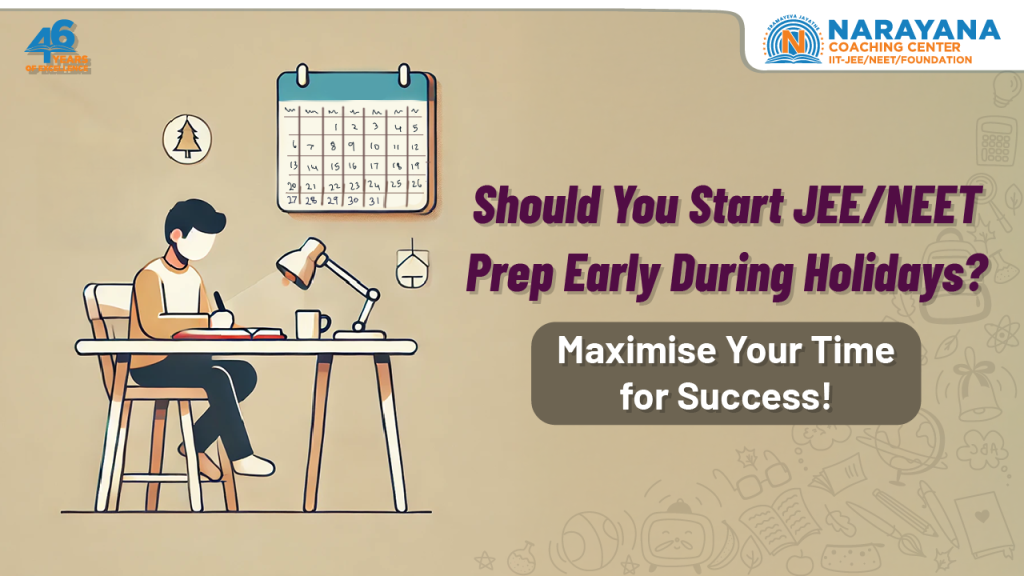
Preparing for highly competitive exams like JEE (Joint Entrance Examination) and NEET (National Eligibility cum Entrance Test) requires dedication, consistency, and strategic planning. While most students wonder whether they should start their preparation early during holidays, the answer depends on multiple factors, including individual learning pace, subject familiarity, and available study resources.
In this blog, we’ll explore the benefits of starting early, potential challenges, and strategies to make the most of holiday study time.
Why Start JEE/NEET Preparation Early?
1. Competitive Edge Over Peers
Starting your preparation early during holidays allows you to gain an advantage over other students who may begin later. It gives you a head start, allowing you to build a strong foundation in Physics, Chemistry, Mathematics (for JEE), or Biology (for NEET).
2. Strong Conceptual Understanding
Holidays provide uninterrupted study time, allowing you to focus on fundamental concepts without school distractions. JEE and NEET demand conceptual clarity rather than rote learning, and early preparation helps reinforce these concepts at a steady pace.
3. Less Stress During Peak Study Months
Most students start feeling overwhelmed as the exam approaches. Early preparation reduces last-minute stress, ensuring that you have ample time for revisions, mock tests, and doubt clearance.
4. Opportunity to Build a Habit of Consistency
When you start studying early, you develop a habit of disciplined study. Establishing a daily study routine during holidays ensures that you remain consistent even after school resumes.
5. More Time for Doubt Resolution and Practice
Starting early means you can identify weak areas and work on them without rushing. You get enough time to seek guidance from teachers, join coaching classes if necessary, and practice complex problems without pressure.
Challenges of Starting Early and How to Overcome Them
While starting early has its benefits, it also comes with challenges that need to be managed effectively.
1. Risk of Burnout
If you study intensively without breaks, burnout can affect productivity.
Solution: Follow the Pomodoro Technique (study for 50 minutes, take a 10-minute break) and include activities like exercise, music, or hobbies to stay refreshed.
2. Lack of Study Material Clarity
Some students might find it difficult to choose the right study materials in the initial phase.
Solution: Start with NCERT textbooks, and once concepts are clear, move to reference books like HC Verma for Physics (JEE), DC Pandey for Physics, or Trueman’s Biology (NEET).
3. Difficulty in Maintaining Motivation
Long preparation periods can lead to a dip in motivation.
Solution: Set small achievable goals, track progress, and reward yourself after completing study targets. Watching motivational videos of toppers and interacting with like-minded aspirants can also help.
4. Balancing Study and Leisure
Holidays are meant for relaxation, and excessive studying can take away the fun.
Solution: Create a balanced schedule that includes study hours, breaks, social activities, and physical exercise.
Effective Study Plan for Holiday Preparation
If you decide to start JEE/NEET preparation during holidays, follow a structured study plan to maximize efficiency.
Step 1: Set Realistic Goals
Instead of trying to cover everything at once, break your syllabus into manageable study chunks. Focus on:
- Physics: Kinematics, Laws of Motion, Thermodynamics
- Chemistry: Atomic Structure, Organic Chemistry Basics
- Mathematics (for JEE): Algebra, Trigonometry, Calculus
- Biology (for NEET): Cell Structure, Genetics, Human Physiology
Step 2: Prioritize Active Learning
Instead of passive reading, use active learning techniques, such as:
- Flashcards for memorization
- Concept Maps to visualize complex topics
- Teaching Others to reinforce understanding
- Attempting Mock Tests to simulate exam conditions
Step 3: Incorporate Regular Revisions
Revision is crucial to retain information for the long term.
- Revise short notes
- Dedicate weekends to revisiting previously covered topics.
- Attempt one full-length mock test per week to assess progress.
Best Study Resources for JEE & NEET Preparation
Books to Start With:
✅ JEE Main & Advanced:
- NCERT (Physics, Chemistry, Mathematics)
- HC Verma (Physics)
- RD Sharma (Mathematics)
✅ NEET:
- NCERT (Biology, Chemistry, Physics)
- Trueman’s Biology
- DC Pandey (Physics)
Online Learning Platforms:
- Unacademy & Vedantu: Live lectures & mock tests
- Physics Wallah: Detailed subject-wise video lectures
- Embibe: AI-based personalized learning platform
Final Verdict: Is It Worth Starting Early?
✅ Yes, if:
✔️ You want a stress-free, well-paced preparation
✔️ You struggle with conceptual clarity and need extra time
✔️ You aim for early syllabus completion and multiple revisions
❌ No, if:
❌ You tend to lose motivation with long study schedules
❌ You prefer structured coaching classes over self-study
❌ You face difficulty in balancing study and relaxation
Conclusion
Starting JEE/NEET preparation early during holidays is an excellent strategy for dedicated students. It provides ample time to strengthen fundamentals, practice extensively, and manage stress effectively. However, consistency, the right resources, and a structured approach are key to making this strategy successful.
If you’re planning to begin early, follow the step-by-step plan outlined above, stay motivated, and balance your study with relaxation. With the right mindset and smart preparation, you can ace JEE/NEET with confidence! 🚀
